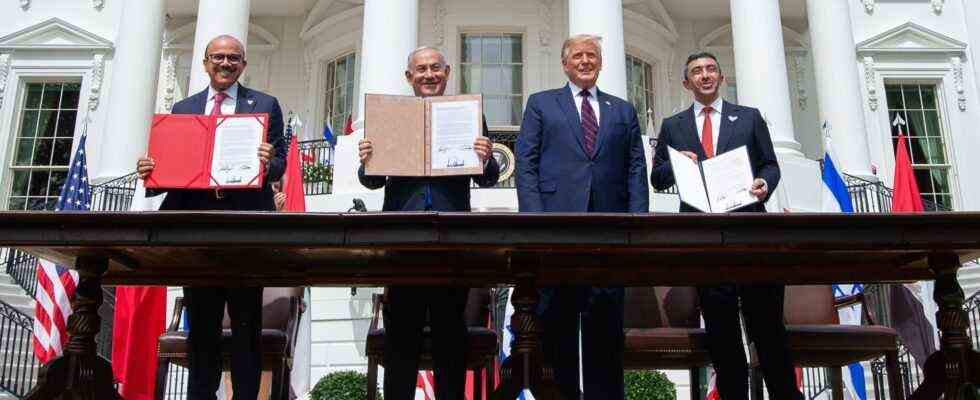Status: 15.09.2021 2:36 p.m.
Official relations between Israel, the United Arab Emirates and Bahrain have existed for a year. There is progress, especially economically. And yet hopes have remained unfulfilled.
A year ago, four men stood before the White House in Washington and signed the so-called Abraham Accords – US President Donald Trump, Israel’s Prime Minister Benjamin Netanyahu, the Foreign Minister of Bahrain, Abdullatif al Zayani and Abdullah bin Zayed, Foreign Minister of the United Arab Emirates. Until that day, Israel had been largely isolated in the Middle East and only had official diplomatic relations with Egypt and Jordan. “This day is a pivotal point in history,” said the then Israeli Prime Minister Netanyahu, “it stands for a new era of peace.”
The Israeli journalist Barak Ravid has closely followed the rapprochement between Israel and the Arab states. He believes that the agreement is a credit to the former US president and “the most important foreign policy achievement of Trump’s tenure”. Ravid therefore pleads for a comprehensive look at Trump’s term in office, even if his legacy is “complex”.
A historic agreement: on September 15, 2020, the signing of the Abraham Agreement in Washington ended the decades of speechlessness between Israel and the leading states of the Arabian Peninsula.
Image: AP
Trump closely on the side of Israel
Under Trump, US support for the State of Israel has never been more intense. The common tensions with Iran certainly ensured the rapprochement between Israel, the Emirates and Bahrain. But promises by the USA were also important. Trump announced the delivery of one of the most modern combat aircraft in the world to the Emirates.
A year ago, the Emirates, Bahrain and later also Sudan and Morocco broke with a principle of Arab countries: that there must first be a Palestinian state and an end to the Israeli occupation before there can be relations with Israel.
Palestinian outrage remains unbroken
The Palestinian politician Hanan Ashrawi is still outraged that the countries have established relations to this day. Israel has been rewarded with normalization for an “abnormal situation” emanating from Israel, she said a few months ago. “It is an implicit recognition of the occupation, the annexation of Jerusalem and the lawlessness and impunity of Israel.” Ashrawi also criticizes that normalization came without Israeli consideration. That will strengthen Israel and weaken international law in the region.
The Emirates and Bahrain pledge to continue to stand by the side of the Palestinians. A planned annexation of parts of the West Bank by Israel is off the table with the agreement.
Israeli journalist Ravid does not believe that the Palestinian issue will prevent Israel from making further deals with the Arab world. But the conflict with the Palestinians still threatens Israel’s existence – it is about Israel’s future as a Jewish and democratic state.
Waiting for Riyadh
One year after the signing of the agreements, relations between Israel and the Emirates are flourishing – in tourism, business, and aviation. Israel hopes that other Arab countries will soon follow suit. Gilad Erdan, Israel’s ambassador to Washington, told the US broadcaster KAN that there are also contacts to Africa, where some countries are influenced by Islam “the greatest will “is that Saudi Arabia will join”.
Saudi Arabia is still holding back. According to media reports, the country’s leadership is divided. It is also about the conflict between Israel and the Palestinians, which has not been resolved for decades.
Historical? One year after the signing of the Abrahamic Accords
Benjamin Hammer, ARD Tel Aviv, September 15, 2021 1:28 p.m.

